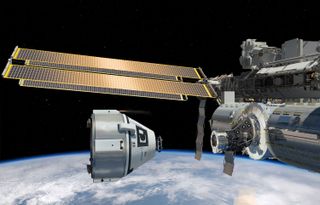Boeing Space Capsule Gets NASA's 1st Commercial Crew Flight Order

NASA has awarded Boeing with the first order for a commercial crew change flight to the International Space Station once the company's new CST-100 space taxi is ready for manned flights in 2017.
Both Boeing and SpaceX are building private spaceships to ferry astronauts on round trips to the space station for NASA. While SpaceX has not received an order yet, NASA said the company will likely receive one later this year. Who flies first will be determined at a later date.
"Final development and certification are top priority for NASA and our commercial providers, but having an eye on the future is equally important to the commercial crew and station programs," said Kathy Lueders, manager of NASA’s commercial crew program, in a statement. "Our strategy will result in safe, reliable and cost-effective crew missions." [Boeing's CST-100 Space Capsule in Pictures]
The milestone follows on from Boeing successfully finishing the fourth stage in its Commercial Crew Transportation Capability (CCtCap) contract with NASA. Boeing showed the agency that its spacecraft design was ready for assembly, integration and testing.
"We’re on track to fly in 2017, and this critical milestone moves us another step closer in fully maturing the CST-100 design," said John Mulholland, Boeing’s vice president of commercial programs, in a statement.
For its part, SpaceX successfully launched an unpiloted pad abort test earlier this month.
NASA makes its orders for CCtCap two or three years before the mission takes place, to give time for the companies to build the spacecraft. That said, Boeing (and SpaceX, when its mission is awarded) will need to fully finish its certification before being allowed to fly the astronauts.
Get the Space.com Newsletter
Breaking space news, the latest updates on rocket launches, skywatching events and more!
Once the crew launches are running, a standard mission will see four crew members on board that are either from NASA or sponsored by NASA. The mission profile calls for the spacecraft to carry 220 pounds of pressurized cargo and to remain docked to the station for up to 210 days.
NASA added that the 2017 flight date depends on Congress awarding the agency's full budget request for the 2016 fiscal year, and the ones following.
Follow Elizabeth Howell @howellspace, or Space.com @Spacedotcom. We're also on Facebook and Google+. Original article on Space.com.
Join our Space Forums to keep talking space on the latest missions, night sky and more! And if you have a news tip, correction or comment, let us know at: community@space.com.

Elizabeth Howell (she/her), Ph.D., is a staff writer in the spaceflight channel since 2022 covering diversity, education and gaming as well. She was contributing writer for Space.com for 10 years before joining full-time. Elizabeth's reporting includes multiple exclusives with the White House and Office of the Vice-President of the United States, an exclusive conversation with aspiring space tourist (and NSYNC bassist) Lance Bass, speaking several times with the International Space Station, witnessing five human spaceflight launches on two continents, flying parabolic, working inside a spacesuit, and participating in a simulated Mars mission. Her latest book, "Why Am I Taller?", is co-written with astronaut Dave Williams. Elizabeth holds a Ph.D. and M.Sc. in Space Studies from the University of North Dakota, a Bachelor of Journalism from Canada's Carleton University and a Bachelor of History from Canada's Athabasca University. Elizabeth is also a post-secondary instructor in communications and science at several institutions since 2015; her experience includes developing and teaching an astronomy course at Canada's Algonquin College (with Indigenous content as well) to more than 1,000 students since 2020. Elizabeth first got interested in space after watching the movie Apollo 13 in 1996, and still wants to be an astronaut someday. Mastodon: https://qoto.org/@howellspace
